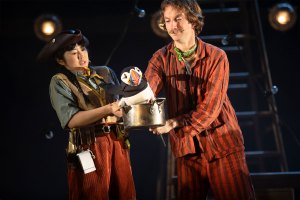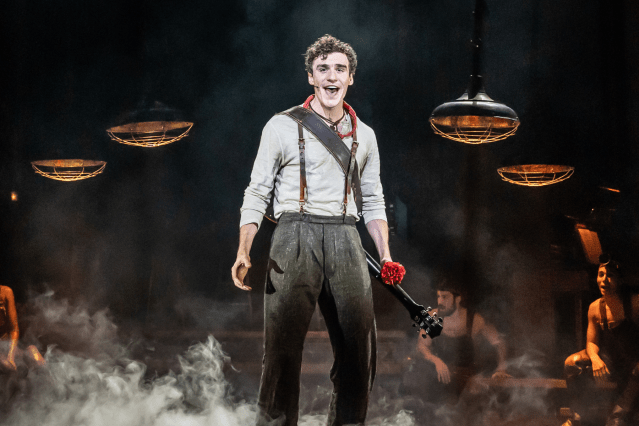Dirty Dancing
Dirty Dancing arrives at the Aldwych with an almost impregnable pedigree. It has taken over £12 million at the box office. It’s an iconic movie for more or less every woman under the age of 35. It proposes the not very brilliant idea that good dancing means good sex, and that physical repression makes you mean-spirited.
It’s admirable that the show follows the 1987 film so faithfully, because Eleanor Bergstein’s story is a good one. Jewish princess “Baby” Houseman on holiday with her family in the Catskills falls in with the entertainment set – she goes backstage with a huge watermelon, remember? – and the mambo-dancing instructor Johnny Castle, played on celluloid by Patrick Swayze, sporting probably the worst mullet in the history of cinema.
Standing in for his pregnant partner – whose abortion is charitably arranged by Baby dredging the dough from her doctor father – Baby scores a hit at the dance cabaret evening and eventually weaves her way into Johnny’s bed, after some enjoyable, guilty diversions in the rain and on the road. Turning her back on her background, Baby takes off and the rest of the ensemble join in. This is 1963, the same year as Caroline, Or Change, but before the death of JFK and the arrival in the US of the Beatles.
This sense of a distant past is well conveyed in James Powell’s production, which arrives in London with all guns blazing, and all stars – from Ian McKellen to Barbara Windsor and Rolf Harris on opening night – gawping, and the management plying first-nighters with complimentary champagne. Unfortunately, not so much attention has been paid to the body on the slab, the show itself, which is badly microphoned, poorly acted and unimaginatively transferred from film to stage.
Scenes just pile up, not flowing with any propulsion or dynamic. The film works better because of the quality of the performances, not least that of the late, great Jerry Orbach as Baby’s father. Here, David Rintoul, a fine actor on his day, is reduced to a cardboard cut-out in a terrible wig. Also dispensed with is the social upheaval implied in the movie when the days of these holiday camps is numbered in the remark that Europe is where people are now going – 22 countries in three days!
Still, the ensemble dance numbers come thrillingly alive in Kate Champion’s choreography, and the central couple of Josef Brown and Georgina Rich are much more attractive than Swayze and Jennifer Grey in the movie, Brown especially taking Johnny on to a higher level of sexual intensity and technical dance ability. He also doesn’t have too annoying a hairstyle. The score is a jukebox of the Chantels, the Drifters, Tina Turner, Otis Redding, and so on, but it doesn’t have the coherent texture of a “proper” musical and often seems quite arbitrary.
In the end, you feel as though you’ve been cudgelled by a brand product, not gone through the genuine experience of musical theatre. The most enjoyable performances, apart from that of Brown and Rich, are those of the gloriously exotic Rae Baker as the married woman with an eye on the resident gigolo, the stunning Nadia Coote as the exemplary dancer and Billy Boyle as a sex-switching hotel resident. Stephen Brimson Lewis’ designs follow the film without finding a new stage language.
– Michael Coveney












